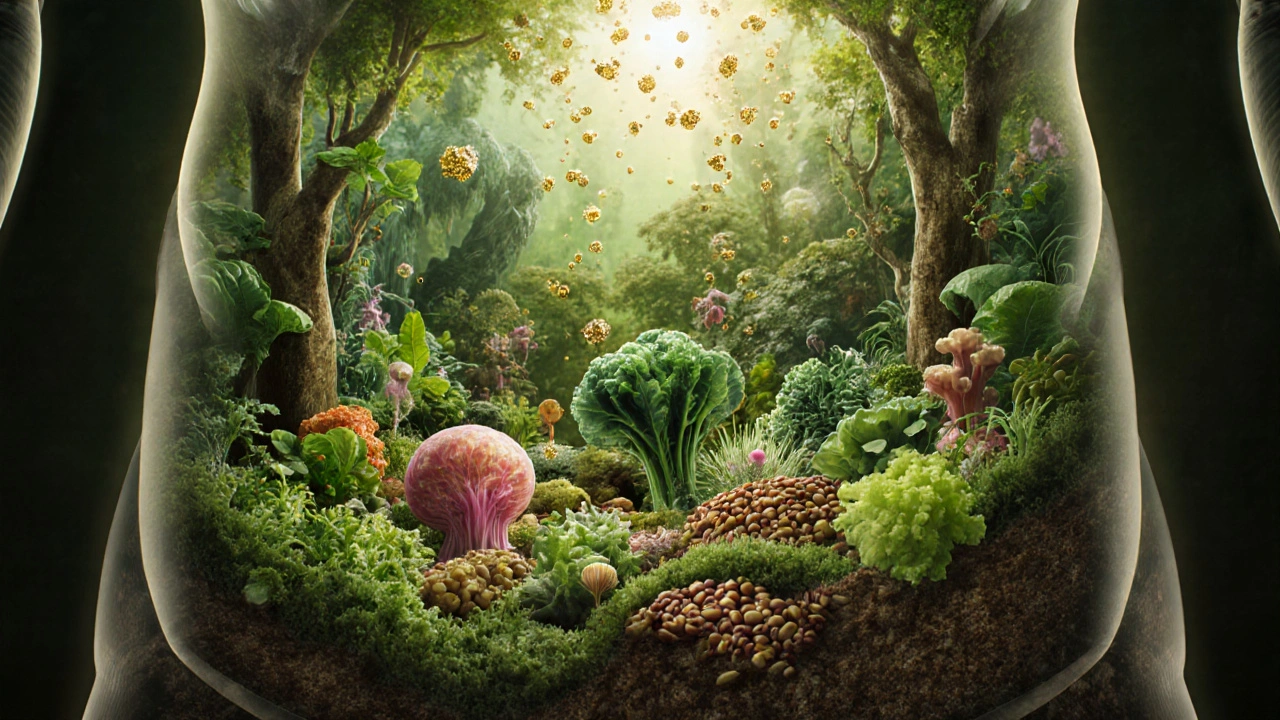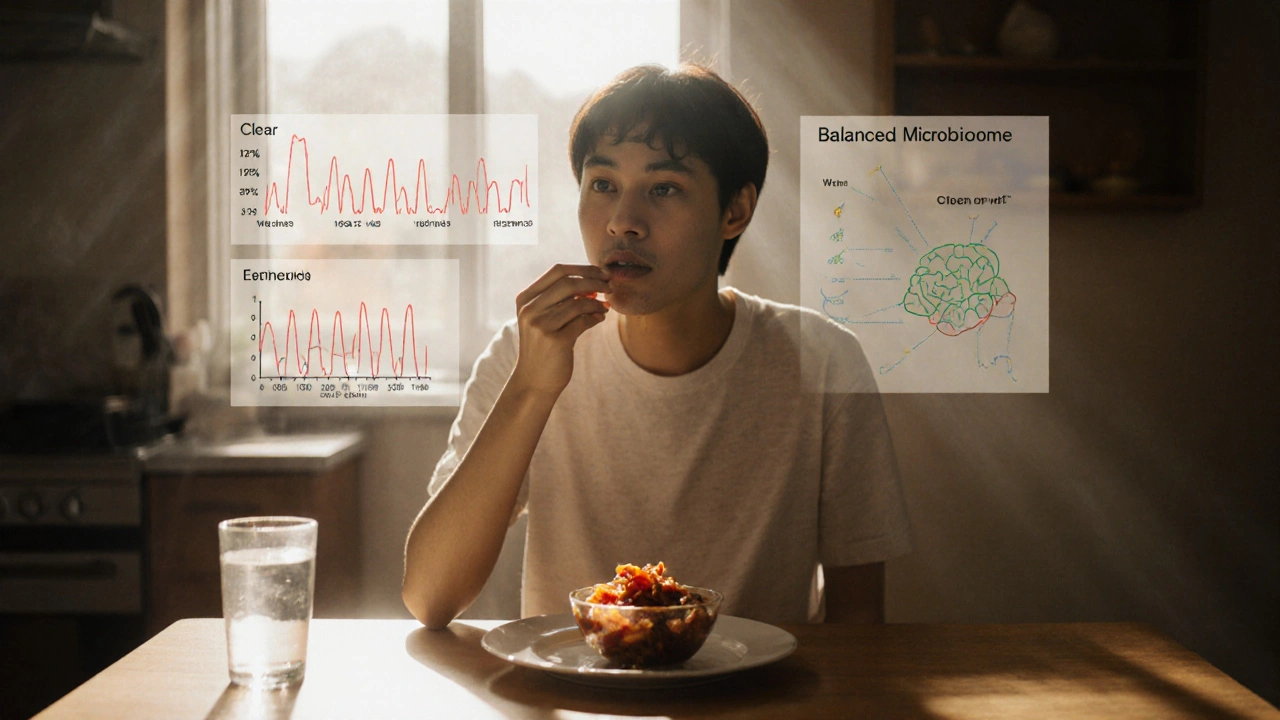What if the key to your energy, mood, and even your immune system isn’t in your vitamins or your workout routine-but in your gut? It’s not a stretch. Your digestive system isn’t just breaking down food. It’s running a complex communication network that talks directly to your brain, your immune cells, and even your skin. When your gut is out of balance, you don’t just get bloating-you get brain fog, anxiety, skin breakouts, and constant fatigue. This isn’t coincidence. It’s biology.
The Gut-Brain Axis: Your Second Brain
Your gut has its own nervous system-called the enteric nervous system-and it contains over 100 million nerve cells. That’s more than your spinal cord. These nerves are wired directly to your brain through the vagus nerve, forming what scientists call the gut-brain axis. This isn’t just a one-way street. Your gut sends signals to your brain about hunger, stress, and even mood, and your brain sends back commands that affect digestion, stomach acid, and gut motility.
When you’re stressed, your body releases cortisol. That shuts down digestion. That’s why you lose your appetite during a big presentation or why you get stomach cramps before a job interview. But the reverse is also true: if your gut is inflamed or imbalanced, it sends distress signals to your brain that can trigger anxiety, depression, or insomnia. A 2023 study in Nature Mental Health found that people with chronic gut issues were 3.5 times more likely to develop anxiety disorders than those with healthy digestion.
The Microbiome: Your Inner Ecosystem
Your gut is home to trillions of bacteria, fungi, and viruses-collectively called your microbiome. Think of it like a rainforest inside you. Some species are helpful, some are neutral, and some are harmful. When the good guys outnumber the bad, you’re in balance. When they don’t, you’re in dysbiosis.
Good bacteria do more than help digest fiber. They make vitamins like B12 and K, produce short-chain fatty acids that reduce inflammation, and train your immune system to recognize real threats from harmless substances. If your microbiome is weak, your immune system gets confused. That’s why people with poor gut health often suffer from allergies, eczema, or autoimmune flare-ups.
Antibiotics, processed foods, and chronic stress are the top three killers of good gut bacteria. A single course of antibiotics can wipe out 30% of your microbiome-and some strains never fully recover. That’s why it’s not enough to just avoid junk food. You need to actively rebuild your gut ecosystem.
What You Eat Directly Controls Your Gut Health
You can’t fix your gut with supplements alone. Food is the most powerful tool you have. Fiber isn’t just for regular bowel movements-it’s fuel for your good bacteria. The average person eats 15 grams of fiber a day. The recommended amount is 30. That gap matters. Every gram of fiber you add feeds beneficial microbes and reduces inflammation.
Focus on these foods:
- Leafy greens (spinach, kale, Swiss chard): Rich in polyphenols that feed good bacteria
- Resistant starches (cooked and cooled potatoes, green bananas, legumes): Act like prebiotics
- Fermented foods (sauerkraut, kimchi, kefir, miso): Contain live cultures that repopulate your gut
- Omega-3 rich foods (salmon, walnuts, flaxseeds): Reduce gut inflammation
On the flip side, sugar, artificial sweeteners, and ultra-processed oils (like soybean or canola oil) feed harmful bacteria and damage the gut lining. A 2024 study from the University of Queensland showed that people who consumed just one artificially sweetened drink a day had 25% less microbial diversity than those who drank water.

How Gut Health Affects Your Whole Body
When your gut is unhealthy, the effects ripple outward:
- Skin: Acne, rosacea, and eczema often improve within weeks of fixing gut inflammation
- Immunity: 70% of your immune cells live in your gut. A weak gut = more colds, longer recoveries
- Weight: Bad gut bacteria can trick your brain into craving sugar and carbs, making weight loss harder
- Sleep: Your gut produces 90% of your body’s serotonin-the hormone that helps regulate sleep cycles
- Joint pain: Chronic inflammation from gut leaks can trigger arthritis-like symptoms
One patient I worked with in Brisbane had chronic migraines for seven years. She tried everything-meds, acupuncture, sleep trackers. Nothing worked. When we focused on her gut-cutting out gluten, adding fermented foods, and taking a specific probiotic strain (Lactobacillus rhamnosus GG)-her migraines dropped from 15 a month to 2 in three months. It wasn’t magic. It was gut healing.
Signs Your Gut Needs Help
You don’t need a lab test to know something’s off. Watch for these red flags:
- Constant bloating or gas after meals
- Food intolerances that appear suddenly
- Brain fog or difficulty concentrating
- Unexplained mood swings or low energy
- Chronic skin issues (acne, rashes, dryness)
- Getting sick often
- Feeling full after eating very little
If you have two or more of these, your gut is likely sending you a signal. Don’t wait for pain to get worse. Start small.

Simple Steps to Improve Your Gut Health Today
You don’t need a detox or expensive supplements. Start with these three things:
- Chew your food. Really chew. Swallowing large bites overwhelms your stomach. Aim for 20-30 chews per bite. It reduces bloating and helps digestion before food even hits your gut.
- Drink water before meals. A glass of water 20 minutes before eating helps activate stomach acid and enzymes. Most people drink water during meals, which dilutes digestive juices.
- Add one fermented food daily. Try 2 tablespoons of sauerkraut with lunch or a small cup of kefir in the morning. It’s cheap, easy, and effective.
After 30 days, most people notice better digestion, clearer skin, and more stable moods. It’s not a miracle. It’s just biology working the way it’s meant to.
When to Seek Help
If you’ve tried dietary changes for 6-8 weeks and still have persistent bloating, pain, diarrhea, or constipation, see a doctor. You might have SIBO (small intestinal bacterial overgrowth), IBS, or a food sensitivity that needs testing. Don’t self-diagnose with trendy elimination diets. A stool test or breath test can identify the real issue.
Also, if you’re taking acid blockers (like omeprazole) long-term, talk to your doctor. These drugs reduce stomach acid, which is essential for killing bad bacteria and absorbing nutrients. Long-term use can worsen gut health and lead to deficiencies in B12, iron, and magnesium.
The Bigger Picture
Gut health isn’t a trend. It’s the foundation of wellness. You can meditate, do yoga, take vitamin D, and still feel off if your gut is broken. Fix your gut, and you fix the root of so many other problems. It’s not about being perfect. It’s about consistency. One meal at a time. One bite at a time.
Your gut is the silent conductor of your health. Listen to it.
Can probiotic supplements fix my gut health?
Probiotics can help, but they’re not a magic fix. Most store-bought probiotics contain only a few strains, and many die before reaching your gut. They’re best used after antibiotics or during flare-ups. For long-term balance, food is better. Fermented foods like kimchi and kefir deliver live cultures naturally, along with fiber and nutrients that help them survive. Think of supplements as a temporary boost, not a replacement for diet.
Does stress really affect my digestion?
Yes, and it’s not just in your head. Stress triggers your body’s fight-or-flight response, which shuts down digestion to redirect energy to your muscles and brain. This reduces stomach acid, slows gut movement, and weakens the gut lining. Over time, that leads to inflammation, leaky gut, and bad bacteria overgrowth. Managing stress through breathing, walking, or sleep isn’t optional-it’s essential for gut health.
Why do I feel better after eating fiber?
Fiber isn’t digested by your body-it’s food for your gut bacteria. When good bacteria ferment fiber, they produce short-chain fatty acids like butyrate, which reduce inflammation, strengthen your gut lining, and even improve insulin sensitivity. That’s why you feel less bloated, more energized, and even less hungry after eating fiber-rich meals. It’s not just about bowel movements-it’s about feeding your inner ecosystem.
Can gut health affect my weight?
Absolutely. Certain gut bacteria are linked to weight gain because they extract more calories from food and trigger cravings for sugar and fat. Others help burn fat and regulate appetite hormones. People with obesity often have less microbial diversity. Fixing your gut doesn’t guarantee weight loss, but it removes a major barrier. Many people lose weight naturally once their gut inflammation drops and cravings stabilize.
How long does it take to heal a bad gut?
You’ll notice small improvements in 7-14 days-less bloating, better sleep, clearer skin. But full gut healing takes time. If your gut lining is damaged or you’ve had long-term antibiotic use, it can take 3-6 months to rebuild a healthy microbiome. The key is consistency. One healthy meal a day adds up. You don’t need to be perfect. Just keep showing up.
If you’ve been feeling off for months-tired, bloated, anxious, or just not yourself-your gut might be the missing piece. Start with one change today. Chew slower. Add sauerkraut to your lunch. Drink water before meals. Small steps lead to big shifts. Your body knows how to heal. You just have to give it the right fuel.






